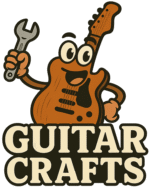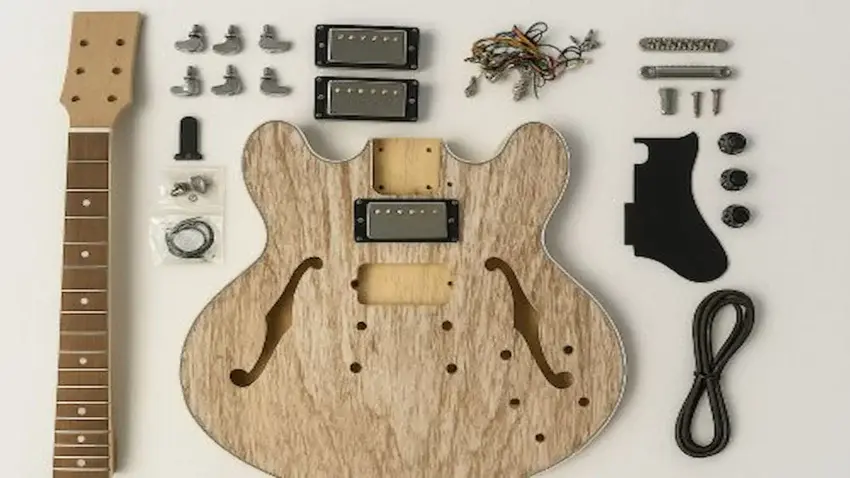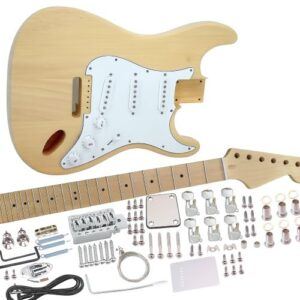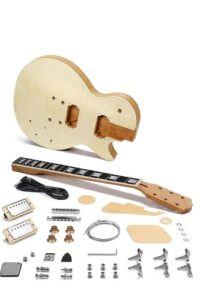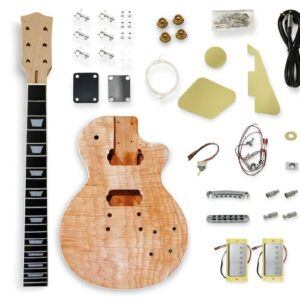If you want to shape your sound from the very first piece of wood, you’re in the right place.
In this Best DIY Electric Guitar Kits for Custom Tone (2025 Guide),
we’re diving into the kits that give you the most room to sculpt your tone, customize your build,
and make a guitar that truly sounds like you.
These aren’t generic starter kits — each one offers tone-friendly woods, solid hardware foundations,
and plenty of upgrade potential so your finished guitar comes alive the moment you plug in.
Whether you’re chasing warm vintage crunch, glassy Strat shimmer, thick LP sustain, or a custom “signature tone,” these kits give you the perfect platform to get there.
And because every kit here is fully buildable at home, you get to shape the feel, the look,
and the tone from the ground up.
Let’s crack open the boxes and see which kit is going to become your next tone monster.

 Amazon Product Suggestion:
Amazon Product Suggestion:
 RSW ST-Style DIY Electric Guitar Kit
RSW ST-Style DIY Electric Guitar Kit
(Basswood / Maple / SSS)
Perfect for bright, snappy tone with tons of upgrade potential
The RSW ST-style kit is your classic, budget-friendly tone platform.
Basswood gives you a balanced, light feel, while the maple neck helps push clarity and brightness —
great for blues, classic rock, and clean tones.
The SSS pickup layout gives you all the Strat spank and shimmer you’d expect.
It’s a simple kit with a lot of potential, especially if you plan to upgrade pickups later.
Why It’s Great:
 Balanced basswood tone for beginners
Balanced basswood tone for beginners
 Maple neck = bright, cutting clarity
Maple neck = bright, cutting clarity
 SSS layout perfect for clean sparkle and blues
SSS layout perfect for clean sparkle and blues
 Super affordable and great for mods
Super affordable and great for mods
 Amazon Product Suggestion:
Amazon Product Suggestion:
 Fesley LP-Style DIY Electric Guitar Kit
Fesley LP-Style DIY Electric Guitar Kit
(Mahogany Body + Purpleheart Fretboard)
Warm, rich tone with beautiful sustain and premium feel
This Fesley kit is gorgeous in person —
mahogany body, carved top, and a purpleheart fretboard that feels smooth and fast.
Mahogany gives you that signature LP warmth and midrange punch,
while the set-neck design enhances sustain.
Great for classic rock, hard rock, and thick lead work.
Why It’s Great:
 Mahogany warmth and mid-focused tone
Mahogany warmth and mid-focused tone
 Purpleheart fretboard looks and feels premium
Purpleheart fretboard looks and feels premium
 LP-style sustain and heft
LP-style sustain and heft
 Ideal for thick, rich tones
Ideal for thick, rich tones
 Amazon Product Suggestion:
Amazon Product Suggestion:
 BexGears LP-Style DIY Electric Guitar Kit
BexGears LP-Style DIY Electric Guitar Kit
(Okoume + Curved Maple Veneer + Ebony Neck)
Ebony brings snap, attack, and pro-level feel
This one punches WAY above its price point.
Okoume delivers LP-style tone close to mahogany, but the real star is the ebony fingerboard.
Ebony gives you crisp attack, clean note separation, and a premium pro-level feel.
Add the curved maple veneer, and you get looks and tone.
Why It’s Great:
 Ebony fretboard = elite clarity
Ebony fretboard = elite clarity
 Okoume body offers warm LP character
Okoume body offers warm LP character
 Curved maple veneer adds brightness + beauty
Curved maple veneer adds brightness + beauty
 Perfect for articulate playing styles
Perfect for articulate playing styles
 Amazon Product Suggestion:
Amazon Product Suggestion:
 Fojill Spalted Maple ST-Style DIY Kit
Fojill Spalted Maple ST-Style DIY Kit
(Roasted Neck + Spalted Maple Top)
This is the tone monster — and the visual jaw-dropper
If tone AND looks matter to you, this one wins the crown.
The roasted maple neck adds stability, warmth, and a smooth playing feel.
The spalted maple top takes this into premium territory with a custom-shop appearance.
It’s a killer platform for bright, expressive tones with a little extra body thanks to the roasted maple.
Why It’s Great:
 Roasted maple neck = stability + sweet warmth
Roasted maple neck = stability + sweet warmth
 Spalted maple top looks like a $2000 custom build
Spalted maple top looks like a $2000 custom build
 Perfect for modders and tinkerers
Perfect for modders and tinkerers
 The best upgrade platform on this list
The best upgrade platform on this list
🔧 Lead-In to the Build Steps
Now that you’ve seen the best tone platforms, let’s walk through how to get the absolute best sound out of whichever kit you choose.
🛠️ 10 Steps to Building a Tone-Focused DIY Electric Guitar
1. Unbox and Inspect Everything
Check the woods, neck pocket, and hardware.
Good tone starts with good raw materials.
2. Dry Fit the Neck and Body
Make sure everything seats cleanly.
Proper fit = better sustain.
3. Sand the Body Smooth
Work your way up through grits.
Smooth surfaces take finish better and resonate more evenly.
4. Prep and Finish the Body
Choose stain, dye, oil, or lacquer.
Your finish affects vibration and resonance.
5. Shield the Cavities
Copper tape or conductive paint reduces hum and lets your tone come through clean.
6. Install the Pickups Carefully
Proper height and tilt have MASSIVE impact on tone.
Don’t rush this step.
7. Wire the Electronics Cleanly
Clean solder = clean tone.
Use a good iron and double-check every joint.
8. Install the Bridge + Hardware
Make sure everything is aligned.
Bad alignment kills sustain.
9. Install the Neck + Set the Relief
Neck relief affects resonance, sustain, and playability.
Don’t skip fine-tuning.
10. Intonate and Dial In the Action
Perfect intonation = your guitar actually sounds good up and down the neck.
🤘 Double-Finger Pro Tips (Because That’s How We Roll)




















🎯 Final Thoughts…
When you build your guitar from the ground up, you’re not just putting parts together —
You’re shaping your tone from raw wood to the final note.
The kits on this list give you a killer starting point, whether you want warm LP sustain,
bright Strat clarity, or a custom-shop look without the custom-shop price tag.
Every kit here can become a serious tone machine with the right setup, the right upgrades,
and a little attention to detail.
If you’re ready to build something that sounds every bit as good as it looks…
Any one of these kits will get you there.
Ready to Start Adjusting Your Tone?
Check out our other guides:

Start with Step-by-Step Guide To Building Your First Electric Guitar Kit and Essential Tools Every Electric Guitar Kit Builder Should Have.

Jump into How To Properly Set Up Your Electric Guitar Kit For Intonation or Fixing Common Problems: Buzzing And Dead Frets.

Head to Understanding Humbucker Vs Single Coil Pickups In Kits or Playing With Tone Controls: Tips For Electric Guitar Kits and start experimenting.
Your Guitar, Your Build, Your Sound
You don’t need a custom shop or a tech on speed dial.
All you need is a little guidance, some patience, and a place to go that shows you what to do next.
Come on man… You got this.
GuitarCrafts is here to help you along the way.
 Craft it. Play it. Own it!
Craft it. Play it. Own it! 
Ready to take your guitar passion beyond the workbench?
See how I built GuitarCrafts.com using the training at Wealthy Affiliate — you can do the same.

